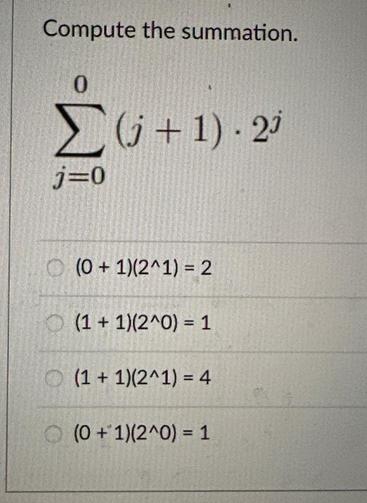Question
Compute the summation. 0 j=0 (j+1).2 (0+1)(2^1) = 2 (1+1)(2^0) = 1 (1 + 1)(2^1) = 4 (0+1)(2^0) = 1

Compute the summation. 0 j=0 (j+1).2 (0+1)(2^1) = 2 (1+1)(2^0) = 1 (1 + 1)(2^1) = 4 (0+1)(2^0) = 1
Step by Step Solution
3.35 Rating (173 Votes )
There are 3 Steps involved in it
Step: 1
The detailed answer for the above question is provided below The summation ...
Get Instant Access to Expert-Tailored Solutions
See step-by-step solutions with expert insights and AI powered tools for academic success
Step: 2

Step: 3

Ace Your Homework with AI
Get the answers you need in no time with our AI-driven, step-by-step assistance
Get StartedRecommended Textbook for
Introduction To Business Statistics
Authors: Ronald M. Weiers
7th Edition
978-0538452175, 538452196, 053845217X, 2900538452198, 978-1111524081
Students also viewed these Programming questions
Question
Answered: 1 week ago
Question
Answered: 1 week ago
Question
Answered: 1 week ago
Question
Answered: 1 week ago
Question
Answered: 1 week ago
Question
Answered: 1 week ago
Question
Answered: 1 week ago
Question
Answered: 1 week ago
Question
Answered: 1 week ago
Question
Answered: 1 week ago
Question
Answered: 1 week ago
Question
Answered: 1 week ago
Question
Answered: 1 week ago
Question
Answered: 1 week ago
Question
Answered: 1 week ago
Question
Answered: 1 week ago
Question
Answered: 1 week ago
Question
Answered: 1 week ago
Question
Answered: 1 week ago
Question
Answered: 1 week ago
Question
Answered: 1 week ago
Question
Answered: 1 week ago
Question
Answered: 1 week ago
View Answer in SolutionInn App



